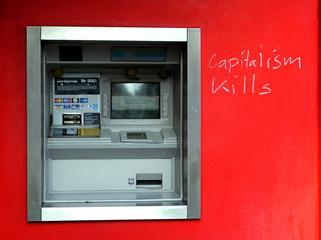Think your day is going bad? Well here's a little perspective to make you feel better.

"We'll need to see some pay stubs."
Amazing how everything is relative, isn't it?
Consider the case of Arthur Livingston of...(ironically enough)...Prosperity, South Carolina.
As reported by ABC News, Mr. Livingston, a successfully employed regional manager of a chemical company, pays his credit card bills in full, has two checking accounts, a savings account, and two college savings accounts for his children. Fiscally responsible behaviors like that would seem to indicate that Mr. Livingston is doing fine and has made the right choices when it comes to caring for his family and managing his finances. But an assumption like that would be naive. This is the real world we're living in, and in the real world, people (like the feckless Mr. Livingston) do reckless things, like keeping their money in reckless, irresponsible, batshit, crazy person places...like The Bank Of America.
Crazy? How?
Crazy like they have the unfortunate depositor, Mr. Livingston, erroneously listed as dead, and have had him as such, since May of 2009. A Bad Day...dead.
Amusing, eh? Well not for the conscientious Mr. Livingston, who has been trying to follow the rules and apply his well deserved and well established good credit history towards the construction of a new home. ...Something that is not going to happen as long as credit agencies investigating his history keep turning up reports from Bank Of America that have him six feet underground being eaten by worms.
Even more frustrating, until Mr. Livingston took his plight to the press, BOA seemed to be in no hurry to help him find his way back to the land of the living.
Which leaves a whole lot of us just a little bit envious.
Ever take a close look at the fees on your Bank Of America credit card?
Yeah.
Enough to make you wish you were dead.
Consider the case of Arthur Livingston of...(ironically enough)...Prosperity, South Carolina.
As reported by ABC News, Mr. Livingston, a successfully employed regional manager of a chemical company, pays his credit card bills in full, has two checking accounts, a savings account, and two college savings accounts for his children. Fiscally responsible behaviors like that would seem to indicate that Mr. Livingston is doing fine and has made the right choices when it comes to caring for his family and managing his finances. But an assumption like that would be naive. This is the real world we're living in, and in the real world, people (like the feckless Mr. Livingston) do reckless things, like keeping their money in reckless, irresponsible, batshit, crazy person places...like The Bank Of America.
Crazy? How?
Crazy like they have the unfortunate depositor, Mr. Livingston, erroneously listed as dead, and have had him as such, since May of 2009. A Bad Day...dead.
Amusing, eh? Well not for the conscientious Mr. Livingston, who has been trying to follow the rules and apply his well deserved and well established good credit history towards the construction of a new home. ...Something that is not going to happen as long as credit agencies investigating his history keep turning up reports from Bank Of America that have him six feet underground being eaten by worms.
Even more frustrating, until Mr. Livingston took his plight to the press, BOA seemed to be in no hurry to help him find his way back to the land of the living.
Which leaves a whole lot of us just a little bit envious.
Ever take a close look at the fees on your Bank Of America credit card?
Yeah.
Enough to make you wish you were dead.

"Thanks Citi...for making me so green!"
But it's not like Bank Of America has a monopoly on data mismanagement.
Oh, no, no, no.
Let us also give props to our good buddies at Citibank for their recent efforts as well. According to a story in the New York Times, the self-proclaimed "world's digital bank" has likewise been digitally screwing up, employing an online bill paying application that has been causing customers to unwittingly make duplicate payments on everything from cable bills to mortgage payments.
That's cool, right? You don't mind accidentally paying your bills twice, do you? It's digital!!! Think of all the trees you're saving!
That's the spirit, 99 per-center. That's the spirit!!!
To their credit, Citibank has not--like Bank Of America--been declaring living people dead, and they have stepped up (or rather, dragged their feet up) to the public relations bar and promised to reimburse their customers for overpayment related penalty fees and interest, ...which will probably mean that some entry level marketing toady will get one less souvenir golf ball at this year's annual meeting...but hey, it's the thought that counts.
In this case, incorrectly,
...and twice.
Oh, no, no, no.
Let us also give props to our good buddies at Citibank for their recent efforts as well. According to a story in the New York Times, the self-proclaimed "world's digital bank" has likewise been digitally screwing up, employing an online bill paying application that has been causing customers to unwittingly make duplicate payments on everything from cable bills to mortgage payments.
That's cool, right? You don't mind accidentally paying your bills twice, do you? It's digital!!! Think of all the trees you're saving!
That's the spirit, 99 per-center. That's the spirit!!!
To their credit, Citibank has not--like Bank Of America--been declaring living people dead, and they have stepped up (or rather, dragged their feet up) to the public relations bar and promised to reimburse their customers for overpayment related penalty fees and interest, ...which will probably mean that some entry level marketing toady will get one less souvenir golf ball at this year's annual meeting...but hey, it's the thought that counts.
In this case, incorrectly,
...and twice.

Mice, anyway.
And lest we end on a high note (Lord forbid!), here's one last Bad Day tale involving banking industry technology gone awry, ...this one with just a little twist. Actually, it's not just a tale with a twist, it's a tale of a TAIL with a twist. Plus, of course, the obligatory dead mouse, $100 worth of Kroners, and the ubiquitous people of Sweden.
Local newspaper Vasterbotten Folkblad reports that a man in northern Sweden by the name of Gholam Hafezi, was attempting to withdraw some cash from a local ATM machine when he noticed what appeared to be a string hanging from the dispenser. Because Swedes naturally love to pull strings hanging out of banking devices, Mr. Hafezi reached out and gave the thread a good yank, only to discover that he had just pulled the tail off a mouse that was jammed in the ATM dispenser.
After enlisting assistance from neighboring merchants, (in this case a clerk at a near-by convenience store--ALWAYS a good choice in rodent related medical emergencies), the man was able to extract the mouse as well as his cash withdrawal receipt.
Squeek.
No word yet from the bank regarding applicable fees for withdrawing dismembered mice. Likewise, no word yet from bank officials regarding any plausible explanations for the presence of the unfortunate rodent.
Then again, these days, banks don't have plausible explanations for anything.
Local newspaper Vasterbotten Folkblad reports that a man in northern Sweden by the name of Gholam Hafezi, was attempting to withdraw some cash from a local ATM machine when he noticed what appeared to be a string hanging from the dispenser. Because Swedes naturally love to pull strings hanging out of banking devices, Mr. Hafezi reached out and gave the thread a good yank, only to discover that he had just pulled the tail off a mouse that was jammed in the ATM dispenser.
After enlisting assistance from neighboring merchants, (in this case a clerk at a near-by convenience store--ALWAYS a good choice in rodent related medical emergencies), the man was able to extract the mouse as well as his cash withdrawal receipt.
Squeek.
No word yet from the bank regarding applicable fees for withdrawing dismembered mice. Likewise, no word yet from bank officials regarding any plausible explanations for the presence of the unfortunate rodent.
Then again, these days, banks don't have plausible explanations for anything.
 RSS Feed
RSS Feed